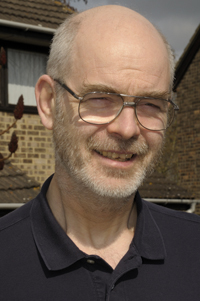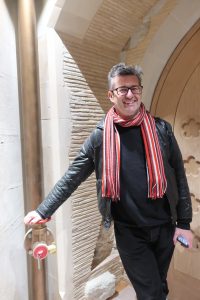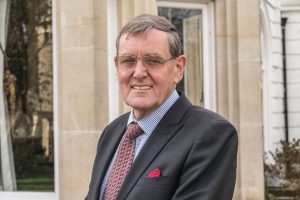RAILWAY HERITAGE TRUST
OFFICERS AND ADVISORY PANEL
EXECUTIVE BOARD
 Andy Savage
Andy Savage
Andy Savage was the Executive Director of the Trust from 2010 to 2022. Following his retirement from that post he has become a non-executive Director and Chair of the RHT.
Prior to joining the RHT, Andy was Deputy Chief Inspector of the Rail Accident Investigation Branch of the Department for Transport, following a long career in railway civil engineering and contractor safety. Andy has a half-century long involvement in railway heritage, with a particular involvement in the Ffestiniog and Welsh Highland Railways.
Andy was awarded an MBE in 2021 New Year’s Honours list for services to the rail industry and heritage.
 Tim Hedley-Jones
Tim Hedley-Jones
Tim Hedley-Jones took over as Executive Director of the RHT in April 2022.
Tim has an MA in Archaeological Heritage Management, as well as a BA in Archaeology and History He started his career in the Diplomatic Service, but moved to the rail industry in 1999. He had a long period with the various East Coast Operators, mainly as their Property Director, and has most recently been Programme Manager for Transport for the North on the Trans Pennine Upgrade. In his period at East Coast Tim worked regularly with the RHT on a series of award-winning projects.
 Ptolemy Dean
Ptolemy Dean
Ptolemy Dean, OBE, joined the RHT Advisory panel in 2012, and was appointed a non-executive director of the company in 2020. Ptolemy is a british architect, television presenter and the 19th Surveyor of the Fabric of Westminster Abbey. He specialises in historic preservation, as well as designing new buildings that are in keeping with their historic or natural settings. Ptolemy studied architecture first at the Bartlett School of Architecture at University College London, then continued with a post-graduate diploma in architecture from Edinburgh University. At Edinburgh, he studied under the late late-modernist Professor Isi Metzstein, building conservation engineer and writer Ted Ruddock, and design critic Mike Duriez.
ADMINISTRATION
 Anna Jipps
Anna Jipps
After studying a degree in Financial Services at Sheffield Hallam and going onto be become an accountant (CIMA), Anna worked in a number of financial and accounting roles, one being with First Capital Connect (FCC) in 2008 – which took in the Great Northern and Thameslink routes.
After developing an interest in the commercial property world, Anna moved into the Property Department and the role of Estates Manager, where she discovered a love of old, listed railway buildings and bringing them back into use. Complementing this, she studied for her RICS, successfully completing the Associate Level in 2014. This position focused on that of landlord to over 100 tenanted commercial properties, with a particular focus on SMEs and independent retailers with a drive to improve the quality of retail at stations.
After taking a year out to have a family, in 2016, Anna moved over to Govia Thameslink Railway (GTR) as Senior Business Development Manager, to take on a role within the Commercial Team to drive ancillary revenue through property management, advertising and media. This position involved a number of projects to renovate station buildings along the route, some partially funded by the Railway Heritage Trust, which then subsequently lead her to her role within the trust today.
PATRONS
 Lady Judy McAlpine
Lady Judy McAlpine
Lady Judy McAlpine is the widow of the Rt Hon Sir William McAlpine, our founding chairman (see below). On Sir William’s death we appointed Lady Judy as our first ever Patron. Not only does this maintain our link with the McAlpines, but Lady Judy adds her own views on matters architectural and heritage to the Trust’s discussions.
 Marcus Binney
Marcus Binney
CBE, Hon FRIBA, FSA Marcus Binney studied the history of art and architecture at Cambridge University and joined the staff at Country Life as architectural writer in 1968. In 1974 he was co-organiser of the exhibition “The Destruction of the Country House” at the Victoria & Albert Museum in London, becoming Chairman of the newly founded SAVE Britain’s Heritage in 1975, which organised the exhibition “Off the Rails: Saving Railway Architecture” at the RIBA Heinz Gallery in 1977. He has set up trusts which saved Isambard Kingdom Brunel’s original but badly decayed 1840 railway terminus at Bristol Temple Meads, All Souls Haley Hill in Halifax, and Barlaston Hall in Staffordshire. He was a member of the British Rail Environment Panel and was appointed a Director of the Railway Heritage Trust in 1984. Since 1991 he has been Architecture Correspondent of the London Times. His publications include “Railway Architecture: The Way Ahead” (1995) and a contribution to “Great Stations of Europe”(1984). He was awarded the OBE in 1983 and the CBE in 2006 for services to the built environment and was a founding director of the RHT in 1984, serving for an incredible 36 years before stepping down, and immediately being appointed a Patron.
 Sir Simon Jenkins
Sir Simon Jenkins
Sir Simon Jenkins FSA FRSL, is a British author, newspaper columnist and editor. He was editor of the Evening Standard from 1976 to 1978 and of The Times from 1990 to 1992. He chaired the National Trust from 2008 to 2014, and currently writes columns for The Guardian.
Of particular interest to the RHT is Simon’s period as a Director of British Rail from 1979 to 1990. When newly appointed he argued strongly with then chairman Sir Peter Parker to try and prevent the demolition of the original station building at Derby, but lost. However, in 1984 he persuaded Bob Reid, Parker’s successor, to set up and fund the Railway Heritage Trust as an independent body that gave grants towards restoring and finding new uses for historic BR-owned buildings and structures. Simon was a founding director of the RHT, and was instrumental in persuading (the then) Rt Hon William McAlpine to be its first chairman. He retains his interest in railway buildings, and in 2017 published a work on his 100 favourite stations. In the 2004 New Year Honours list Simon was knighted for his services to journalism.
Jim Cornell
 Jim Cornell, FREng; FICE, FCILT, FCMI, FPWI, spent more than fifty years working in the railway industry until his retirement in January 2010. He first joined British Railways as a civil engineering student apprentice in 1959 and undertook a series of management tasks including Divisional Civil Engineer at both Kings Cross and Newcastle and Regional Civil Engineer for Scotland. He was appointed Deputy General Manager of ScotRail in 1984 and became General Manager there in 1986. The following year he was appointed Director of Civil Engineering for British Rail, a post he held until becoming Managing Director of Regional Railways in 1992. Subsequently, he played a significant part in the privatisation process, as Group Managing Director of British Rail Infrastructure Services from 1993 to 1996. After the completion of the privatisation process in 1996 he was appointed Executive Director of the Railway Heritage Trust, which position he held until his retirement. During the period from 1996 to 2010 Jim’s other roles included being a member of the Railway Heritage Committee, a Director of Railway Paths Ltd, and a Non-Executive Director of firstly Railtrack PLC, and subsequently Network Rail. After his retirement in 2010 Jim became a member the Trust’s Advisory Panel, rejoining its Board as Deputy Chairman in 2016. Jim became Chairman after Sir William died in 2018, a post he held until he fully retired in the summer of 2022.
Jim Cornell, FREng; FICE, FCILT, FCMI, FPWI, spent more than fifty years working in the railway industry until his retirement in January 2010. He first joined British Railways as a civil engineering student apprentice in 1959 and undertook a series of management tasks including Divisional Civil Engineer at both Kings Cross and Newcastle and Regional Civil Engineer for Scotland. He was appointed Deputy General Manager of ScotRail in 1984 and became General Manager there in 1986. The following year he was appointed Director of Civil Engineering for British Rail, a post he held until becoming Managing Director of Regional Railways in 1992. Subsequently, he played a significant part in the privatisation process, as Group Managing Director of British Rail Infrastructure Services from 1993 to 1996. After the completion of the privatisation process in 1996 he was appointed Executive Director of the Railway Heritage Trust, which position he held until his retirement. During the period from 1996 to 2010 Jim’s other roles included being a member of the Railway Heritage Committee, a Director of Railway Paths Ltd, and a Non-Executive Director of firstly Railtrack PLC, and subsequently Network Rail. After his retirement in 2010 Jim became a member the Trust’s Advisory Panel, rejoining its Board as Deputy Chairman in 2016. Jim became Chairman after Sir William died in 2018, a post he held until he fully retired in the summer of 2022.
ADVISORY PANEL
RHT
RHT
Hiro Aso
Advisory Panel Member since 2023.
Hiro is Transit Hubs Sector Lead for Jacobs. He is an award-winning specialist in the initiation, conceptualisation, design, management and delivery of complex, regenerative, rail estate development, always within sensitive contexts, often rich in history. Hiro sees the public transportation system as one of the most important and dynamic projection of our culture – as cultural infrastructure – and looks forward to supporting the critical efforts of the Railway Heritage Trust with this mindset.
Tim Bryan
Born in Bristol, England, Tim studied geography at the University of Wales Aberystwyth before working briefly as a Librarian and has worked in museums for more than 25 years, beginning his career at the Great Western Railway Museum in Swindon in 1983 before leading the curatorial team that created the award-winning STEAM: Museum of the GWR in 2000. From 2000 he was Collections Manager and then General Manager at STEAM before being appointed as Head of Collections and Interpretation at the Heritage Motor Centre, Gaydon in 2004.
In 2019 he was appointed Director of the Brunel Institute at Bristol.
The author of eight books including a biography of the engineer Brunel published in 1999, Tim has also written numerous articles and reviews on heritage and railway subjects. He is Secretary of the Association of British Transport & Engineering Museums and Co-Chair of the UK Inland Transport Subject Specialist Network and a Council member of the Association of Independent Museums.
Professor Dugald Cameron
Industrial designer, aviation and railway artist. Born Glasgow 1939; educated at High School of Glasgow and Glasgow School of Art. Industrial designer, free lance practice from 1961; Senior Lecturer in charge of Industrial Design, Glasgow School of Art 1971; Head of School of Design, Glasgow School of Art 1982; Director/Principal, Glasgow School of Art 1991-99. Currently Visiting Professor, University of Glasgow (Department of Aerospace Engineering); Visiting Professor, University of Strathclyde (Department of Design, Manufacturing and Engineering Management); Chairman, Prestwick Airport Consultative Committee; Hon Patron, Universities of Glasgow and Strathclyde Air Squadron; Hon Patron, House for an Art Lover, Glasgow; sometime Public Member, Network Rail. Recent publications (with others): “A Sense of Place” (Glasgow Airport at the Millennium); “From Pilcher to the Planets”(Scottish/Glaswegian contributions to aviation); “Drawn to Scottish Steam”; “Glasgow Central Central to Glasgow”. Companion of the Royal Aeronautical Society 1996; Lord Provost of Glasgow’s Gold Medal for Education 1998; OBE 2000; DSc (Hon) Strathclyde 2002.
Richard Broyd
OBE Richard Broyd started and ran a professional recruitment agency, now called HAYS, from 1968-87. Since 1980 he has been involved as a conservationist with the built heritage, through Historic House Hotels (now part of the National Trust), and other projects involving houses, gardens, landscapes, and railways. He believes in ‘status quo ante’, and making the past work for, and benefit, the present and the future. He is a trustee of the War Memorials Trust, and has received the Prince of Wales Medal for Arts Philanthropy.
Debbie Dance
OBE, MSc, FRICS, IHBC, RSA
Advisory Panel Member since 2020
 Debbie Dance is the Director of Oxford Preservation Trust. She has spent her career in the built and natural environment working as a chartered surveyor in the commercial market before moving into the Heritage world. She has worked in London, Birmingham and Oxford, and has completed a number of award winning conservation projects including OPT’s regeneration of Oxford Castle.
Debbie Dance is the Director of Oxford Preservation Trust. She has spent her career in the built and natural environment working as a chartered surveyor in the commercial market before moving into the Heritage world. She has worked in London, Birmingham and Oxford, and has completed a number of award winning conservation projects including OPT’s regeneration of Oxford Castle.
Debbie has held a number of honorary national roles, and is currently Chair of the Historic Chapels Trust. She was awarded an OBE for her services to Heritage in 2013 and made an Honorary Doctor of Oxford Brookes University in 2018. Debbie was the conservation judge for International RICS Property Awards for many years and has been past Chair of the Historic Towns Forum, UK Association of Preservation Trusts, and a former Trustee of the Churches Conservation Trust, Heritage Lottery Fund South East and Oxfordshire Historic Churches Trust. Debbie is a board member of the Oxford Playhouse and of Experience Oxfordshire, the County’s tourism destination management organisation
Tim Dunn

Tim Dunn is a broadcaster, historian, geographer and marketer. The son of a former British Rail chartered surveyor, he spent much of his childhood touring the UK with family looking at interesting buildings, then studied Geography at Exeter University, specialising in heritage and planning matters.
As a broadcaster he has presented three TV series of “The Architecture the Railways Built” for UKTV, and works with a number of museums, train operating companies and heritage railways to present their own social media live broadcasts. He is also Travel Editor for the independent rail app and website, Trainline.
He has served as a trustee or board director for the British Postal Museum & Archives, the Sierra Leone National Railway Museum and the Miniature Railway Museum Trust. As a historian he has curated exhibitions on miniature railways and model architecture, writes for various magazines and contributes to TV and radio programmes on historic railway matters.
Jamie Coath
BA DipArch DipCons AA RIBA Jamie is a Chartered Architect with a postgraduate diploma in building conservation. He is a partner with the firm Purcell UK where his specialist expertise lies in taking conservation projects with initial potential and creating viable schemes. He has experience working with key statutory bodies and the heritage lobby, and has daily dealings with the Heritage Lottery Fund and English Heritage (he is an advisor to both bodies), local planning authorities, and Conservation Officers. He has a strong technical bias and expertise in various conservation issues, fulfilling the role of stonework expert within his company. He is also skilled at writing conservation management plans.
Dr William Fawcett
Lord Faulkner of Worcester
Richard Faulkner returned to the Advisory Panel following the change of government, having stood down from it on becoming a minister with responsibilities for transport in the government whips’ office in the House of Lords in 2009. He was previously Chair of the Railway Heritage Committee, a trustee of the National Museum for Science and Industry, Vice-President of Transport 2000, and treasurer of the parliamentary all-party railways group. He was a deputy speaker in the House of Lords, and spoke extensively on transport and environmental issues. Prior to joining the House in 1999 he was for 20 years an adviser to the British Railways Board. Other positions include honorary fellowships at Worcester College Oxford, and the University of Worcester. He has resumed the Presidency of the Cotswold Line Promotion Group, and membership of First Great Western Trains Advisory Group.
Dr Ann Glen
Ann Glen comes from a family of civil and mechanical engineers with links to railways. She is a graduate of Glasgow and Strathclyde Universities, a Fellow of the Royal Scottish Geographical Society and by profession a geographer and economic historian. Her career has covered teaching, lecturing and research. The Fellowship was conferred for her contribution to geographical education and for assistance to the RSGS over many years.
With an interest in transport history, especially relating to railways, she is the co-author of several books, notably on the Caledonian and Great North of Scotland Railways and contributes to periodicals on transport themes. Other publications have been ‘The Cairngorm Gateway’ (Scottish Cultural Press, 2003), ‘Airdrie-Bathgate Rail Link’ (2010), and ‘The Waverley Route, Its Heritage and Revival’ (2015) that also marked the opening of the Borders Railway.
From childhood, a fascination with railways began and this has continued in organising commemorative events for historic Scottish lines and in support for heritage railways. Now active in local government on a Community Council in North Lanarkshire, Ann has served on the Local Government Boundary Commission for Scotland, on the Rail Passengers Committee Scotland, and represents Strathclyde on the Scottish Association for Public Transport. She is a ‘hands on’ station adopter in a programme that seeks to make railway stations and their surroundings more attractive to passengers and also environmentally friendly.
Christopher Fildes
Christopher Fildes OBE D Litt is a financial columnist, author and broadcaster of many years’ standing, a writer on railways and a member of the Railway Heritage Committee. His railway correspondent, I K Gricer, features in The Spectator.
Chris Heaps
Graduated with a law degree from the University of Exeter in 1964, qualified as a solicitor in 1967 and articled to Jaques & Co in Gray’s Inn. He became a partner in 1972 and so remained until retirement from the firm (by then Eversheds) in 1996. After being the President of Holborn Law Society in 1983/4, he was a member of the Council of the Law Society between 1985 and 1997, and between 1991 and 1997 was appointed by the Lord Chancellor and Lord Advocate as a member of the Council on Tribunals. Between 1997 and 2007 he was a Traffic Commissioner, a statutory regulator of the bus and coach (PSV) and heavy goods (HGV) industries, in the Western Traffic Area and the South Eastern & Metropolitan Traffic Area respectively. Following a period as a member of the Transport Users Con sultative Committee for London, commencing in 1981, he was appointed as a Deputy Chairman of its successor statutory body, the London Regional Passengers Committee, between 19 85 and 1992. He has been a Non-Executive Director of Porterbrook Leasing Co Ltd and Chairman of its Safety Committee. Between 1998 and 2004 he was the Chairman of the Railway Study Association and he is currently a member of the First Great Western Advisory Board. Chris Heaps has published four books about railways, and has been a regular contributor to transport magazines and books including “The Inter-City Story”.
Chris Green
MA, FCIT, FIRO Career railwayman who joined British Rail in 1965 and retired as Chief Executive of Virgin Trains in 2004. Wide range of posts across Britain including General Manager, Scotland, where he led the new ScotRail brand and upgraded the large heritage stations. As Managing Director, Network SouthEast he united the London commuter services into a single brand and accelerated the upgrading of the heritage stations. As Managing Director, InterCity he continued the upgrading of the stations prior to privatisation. Appointed Chief Executive, English Heritage 1995-6 before returning to the rail industry as Chief Executive Officer, Virgin Trains. Chairman, Railway Forum, Non-Executive Director, Network Rail 2005-10 and joint author of independent DfT review into ‘Better Rail Stations’ 2009. Chris studied Modern History at Oriel College Oxford and is a Fellow of the Chartered Institute of Logistics and Transport and also the Institution of Railway Operators.
John Ives
JOHN A IVES Dip Arch RIBA AABC a Conservation Accredited Architect. John trained at Leeds School of Architecture before joining the British Rail’s Architect’s office in York and worked in that office through its various iterations until privatisation in 1994. He worked on many of the former Eastern Region’s building stock particularly the main “InterCity” stations and was the Architect to the East Coast Electrification team dealing with the various planning authorities and the Royal Fine Art Commission. At privatisation John was leading the York office. Following privatisation John was a Partner and then a Director of the York based Architect’s practice of PPIY Limited. The practice continued to carry out railway related work for both the “Big” railway (for both Network Rail and the Train Operating Companies) and for the Heritage Railways.
John is a Judge and Adjudicator for the National Railway Heritage Awards, a member of the York Civic Trust Planning Team and Chair of the City of York Conservation Areas Advisory Panel and until 2018 was a Monitor for the Heritage Lottery Fund. John is a working member of the North Yorkshire Moors Railway involved with restoring and preserving their historic building stock.
Stanley Hurn
Stanley Hurn is a retired international banker with a lifetime interest in railways and architecture. He spent almost forty years working in the City of London, most recently as a Director of HSBC Investment Bank (formerly known as Samuel Montagu & Co). During the course of his career he has travelled widely and has given seminars on international lending in financial centres around the world. In 1992 he published a book on ‘big ticket’ international lending entitled “Syndicated Loans – A Handbook for Banker and Borrower” and has written extensively in banking and financial journals. He is a Freeman of the City of London and a Liveryman and Court Member of The Worshipful Company of International Bankers. His interest in railways comes from his family background – his father was a lifetime railwayman. In 1989 he bought Gunton Railway Station in Norfolk, then in dilapidated condition, and has restored and renovated it to a high standard receiving four separate conservation awards on the way including, in 2009, a National Railway Heritage Award (The First Group Craft Skills Award).
Sarah Kendall
 Advisory Panel Member since 2021
Advisory Panel Member since 2021
MBA, FICE, FIRO. Sarah has worked in rail since joining British Rail in the 1980s. Within UK rail she has worked primarily in operations, maintenance and customer service management roles including as Station Manager Carlisle, Production Director for CrossCountry and Network Rail’s Area Director for Wales. She has worked internationally including at Eurotunnel during the commissioning and commercial start up and for Arriva as Business Improvement Director, mainland Europe on tram, bus and light rail projects as well as heavy rail. Now an independent consultant, her work includes projects for the Department for Transport and Train Operating Companies, advising Infrastructure Ontario on the expansion of Toronto regional rail services and advising the Irish National Transport Authority on the planned MetroLink. She is a Commissioner and Trustee for the Independent Transport Commission.
Chris Leah
Chris Leah retired from the Board of Network Rail in 2004 after having completed 38 years in the railway industry. He was previously Board Member for Railtrack plc and a Regional Director of Regional Railways, both in North West England and Scotland. Since his retirement from the industry he has taken on the position of Operations and Safety Director of the Ffestiniog and Welsh Highland Railways and has also become Chairman of the Board of Trustees at Bressingham Gardens and Steam Museum at Diss, in Norfolk. He was a founding director of the Institution of Railway Operators and is currently Vice-President. He is also Past President of the Railway Study Association.
Geoff Mann
BArch, MCD, RIBA Gained first class honours degree and Reilly Gold Medal in architecture at Liverpool University in 1962. Followed by a post-graduate degree in Civic Design obtained in 1963. Joined Andrew Renton Associates in 1969. Made an associate of the practice in 1971. Began working in the City of London and Westminster on commercial buildings which, at that time, were new to the practice. Made full Partner of the practice in 1980. The practice developed in the 1980s to 150 staff which involved major projects controlled by Geoff Mann including Waterloo, Battersea Power Station, British Airways Headquarters and BP Headquarters. At the end of the 1990s work involving listed buildings and renovation projects became a significant part of the practice. Apart from dealing with several buildings for Heron International, historic buildings such as County Hall on the South Bank, St Pancras Chambers, the Brighton Dome and the Coliseum for the ENO became important projects, three of which Geoff Mann controlled. County Hall and St Pancras are nearing completion. When not involved in the above, Geoff spends his time at his railway station at Saughtree in the Scottish Borders. He is also an Associate Director of Coventry City Football Club.
Benedict O'Looney
Benedict runs an architecture practice in south London, working on new build and conservation projects, particularly in Southwark, including the renovation of the Grade ll listed Peckham Rye Station for Network Rail and Southwark Council. Other recent railway architecture work the restoration & re-opening of four railway arches at Findlater’s Corner, London Bridge Station for the Arch Company. Since obtaining his Master of Architecture degree from Yale University, Benedict worked with Grimshaw and Alsop Architects, where an interest in new architecture in historic settings was developed. Benedict taught architecture history and sketching for 11 years at the Architectural Association, at the Kent School of Architecture, the Canterbury School of Architecture, and for New York University’s London program. He is chairman of Southwark’s Conservation Areas Advisory Group, on the Victorian Society’s Southern Building Committee and a past president of the London Sketch C
Frank Paterson
Joined London North Eastern Railway from school in 1946 and spent 40 years in management posts in British Rail’s Scotland, Eastern, Great Western and Southern Regions. He was Director Freight, British Railways Board from 1976-78 and General Manager Eastern Region from 1978-86. He has been a member of the National Railway Museum Advisory Board since 1978 and is Chairman of the Friends of the National Railway Museum. He is also a trustee of York Civic Trust; Chairman, Fairfax House, Georgian Town House Museum and Vice-Chairman, York & Selby Branch, CPRE (Campaign to Protect Rural England).
Oliver Pearcey
Following 13 years in the Department of the Environment, Oliver Pearcey worked for English Heritage for 21 years, latterly as Director of Conservation. He is now a freelance historic environment consultant, and also has intensive involvement in the charitable sector, as Chairman of the Kew Bridge Engines Trust and as a trustee of the Historic Chapels Trust, the Waltham Abbey Royal Gunpowder Mills Foundation, and the Country Houses Foundation among others. He is a member of the Institute of Historic Building Conservation. He has had a lifelong interest in post-mediaeval and industrial archaeology and has been involved in survey and excavation work in these areas, particularly at the Fulham Pottery in West London, a site world famous for John Dwight’s experimental work in the 17th century on stoneware and porcelain manufacture.
John Prideaux
CBE John Prideaux is Chairman of the Festiniog Railway Company, and also Chairman of the Ffestiniog Railway Trust, the charity that holds the controlling interest in The Ffestiniog and Welsh Highland Railways. The Festiniog Railway Company manages the railways, both directly and through subsidiaries such as Welsh Highland Railway Construction Limited. He has been a Trustee for 18 years, Chairman of the Trust since 1998, and Chairman of the Company since 2006. Most of John Prideaux’s working life has been spent in the railway industry. His reputation was established while Managing Director, InterCity from 1986 to 1992. During this period InterCity was transformed from a business losing 25% of turnover into the world’s only profitable main line passenger railway. At the same time InterCity electrified the line from London to Edinburgh. He completed his British Rail career by establishing the route for the Channel Tunnel Rail Link and by establishing St Pancras as the London terminal. Since leaving British Rail he has been Chairman of Angel Trains (the rolling stock Company that has purchased 65% of the new trains in Britain), a Director of the Docklands Light Railway, and Chairman of the Manchester Tram System. He advises on railway policy. He is also very interested in historic buildings (having restored a 17th century house and 15 historic farm buildings over the last 10 years), in architecture and design, and in transport economics and policy.
Malcolm Reed
CBE Dr Reed retired in 2009 from his post as the first Chief Executive of Transport Scotland, the Scottish Government agency responsible for trunk roads and railways north of the border. From 1997 to 2005 he was Director General of Strathclyde Passenger Transport Executive, following previous appointments with Strathclyde Regional Council and the then Greater Glasgow Passenger Transport Executive. He has served as a member of the Advisory Committee of the Rail Safety & Standards Board and is a former Deputy Chairman of the Railway Heritage Committee. He is currently an adviser to Virgin Trains and a Council Member of the Institution of Engineers and Shipbuilders in Scotland, and is a Fellow of the Chartered Institute of Logistics & Transport and of the Chartered Institution of Highways & Transportation.
Simon Rigge
BA (Oxon) Simon was educated at Tonbridge School and Oriel College, Oxford. In his first job he was Assistant to Barrie Pitt, Editor of Purnell’s partwork History of the Second World War. Later he was Executive Editor of the History of the 20th Century working under J M Roberts as General Editor and A J P Taylor as Editor-in-Chief. After a short stint on The Observer he moved to Time-Life Books where he was a staff writer and later Deputy Editor of The British Empire, a partwork history published jointly with BBC TV. Transferring to books, he was Deputy Editor of The World’s Wild Places and The Great Cities series. In 1979 he founded Sheldrake Press, publishers of illustrated non-fiction specializing in history, travel, architecture and design (www.sheldrakepress.co.uk). Among their titles is The Railway Heritage of Britain by Gordon Biddle and O S Nock. This official gazetteer of listed railway structures was commissioned on behalf of the British Railways Board by Bernard Kaukas, Director – Environment. Simon Rigge is the author of War in the Outposts in the World War II series (Time-Life Books, 1980) and many articles on 20th century history. He is the Editor of The Victorian House Book by Robin Guild, the Wild Guides series under the general editorship of Douglas Botting and many other works of history. Behind many of his publishing decisions lies a belief in environmental conservation and good architectural detail.
Martin Robertson
Martin Robertson is an architectural historian who has worked mainly for the government historic buildings service, concerned with the survey and aftercare of listed buildings. This involved much contact with the buildings and structures of the railways in England and Wales, both selecting them for listing and in encouraging British Rail to look after its historic structures more sympathetically than it had been doing. This soon developed into a special interest and he became the principal source of advice on railways for English Heritage from 1984-93. Since 1993 he has been a self-employed consultant and his work has included a survey of railway building types for English Heritage, checking that all the important areas had been properly covered by the listings. He was one of the authors of “The Railway Heritage of Britain” (1983) and one of the Editorial Advisors to “The Oxford Companion to British Historic Railway Buildings” (2003).
Paul Simons
Born 1951. Originally from Lancashire, Paul trained as an architect in London and is a past Lethaby Scholar with the Society for the Protection of Ancient Buildings. He has spent a life working with historic buildings including being the Project Director of Brunel’s original Bristol Station between 1980 and 1986 during which the 150th anniversary celebrations were held for the founding of the GWR. Paul has been a Museum Director and Head of Tourism in Norwich and Bath. He was a founder of the Vivat Trust and a trustee of Clevedon Pier. Paul is a Director of McCurdy & Co who built the replica of Shakespeare’s Globe Theatre in London and which specialises in the repair of historic timber structures. He is Vice-Chair of the National Heritage Training Group and Vice-President of the European Spas Association. Paul lives in Corsham, Wiltshire where he is Vice-Chairman of the local rugby club and a trustee of Bath Rugby Club.
Jerry Swift
Jerry Swift FPWI MBIFM was, until 2014, Head of Community Rail at Network Rail, a post he occupied (along with a period as Head of Corporate Responsibility) for some 10 years. Working with the Trust, community rail partnerships and the railway heritage sector, Jerry has been involved in a number of projects including work with the listing bodies on signal boxes and the subsequent history project being run by the Friends of the National Railway Museum, both of which are supported by the Trust. He has been an active champion within Network Rail of alternative new uses for historic railway property and has supported some of the more recent high-profile schemes that have seen a number of heritage railways moving into new territory, such as the extension of the Swanage Railway to Worgret Junction, the return of the Bluebell to East Grinstead, the return of the North Yorkshire Moors Railway to Whitby and the subsequent construction by the company of Platform 2, and the return of the Spa Valley Railway to Eridge. Jerry was a member of the Railway Heritage Committee and the Railway Heritage Designation Advisory Board until his departure from Network Rail. He remains on the RHDAB’s forum.
Robert Thornton
Dip Arch RIBA, FRSA Having retired from Network Rail in November 2013, Robert Thornton’s architectural career spanned nearly forty years in the railway industry. This commenced in 1974 on the Western Region of British Rail where he became project architect for a wide range of buildings including the restoration of the former Royal Waiting rooms at Paddington Station which nurtured a growing interest in the integration of modern operations into a historic context. He went on to become the Project architect for the early stages of the redevelopment of Kings Cross Railway Lands and Station and, with Union Railways, St Pancras. Later, in Railtrack and Network Rail, he took on the responsibility for the Masterplan designs for all the major stations, during which time he developed design and heritage guidance in collaboration with English Heritage, Cadw and Historic Scotland and produced the first conservation and design management plan for Paddington Station. In 2007 he became Head of Station Design for Network Rail (later Principal Architect) where, whilst still actively engaged in projects of all scales and sizes – particularly those with an important historic context, he turned his attention to the further development of technical standards and guidance related to aspects of operational building design. These have included such topics as sustainability, safety, wayfinding, materials specifications and over-arching design guidance such as Network Rail’s web based, all embracing, ‘Guide to Station Planning and Design’.
Peter Trewin
Peter Trewin is a life-long railwayman, having worked at all levels in the industry, latterly as Secretary of the British Railways Board. He was also Secretary to the Strategic Rail Authority and BRB (Residuary) Ltd, retiring when that company was abolished in September 2013. He was responsible for the BRB’s archive and was a member of the Railway Heritage Committee from its inception, following privatisation, up until 2006.
Adam Wilkinson
Advisory Panel Member since 2012
Adam Wilkinson has been Director of Edinburgh World Heritage (EWH) since April 2008. He is responsible for providing executive leadership and overall management of EWH, its staff and other organisational and financial resources, and for developing EWH’s national and international networks and partnerships. He holds an MA in Medieval History and Russian Language and an MSc in Historic Conservation. He brings a broad knowledge of UK conservation policy and architectural history, through his previous roles as Secretary of the campaigning charity SAVE Britain’s Heritage and its sister organisation SAVE Europe’s Heritage. Prior to this he worked for a short stint in Paris for UNESCO’s Division of Cultural Heritage. Internationally, Adam supports a range of other historic cities in considering the management of their heritage and communities.
Malcolm Wood
Malcolm joined the British Railways Board Chief Architect’s Department Western Region office in 1979, later working in Network South East, Railtrack and Network Rail on a variety of historic railway buildings. He joined the Railway Heritage Trust as Company Secretary in 2008, retiring from the post at the very end of 2017, but remains both a Committee Member and judge for the National Railway Heritage Awards.
Daniel Wright
Daniel has a keen interest in transport design and infrastructure, and railway architecture in particular. He holds a first class honours degree in transport from Aston University. In 2012 he created transport design and architecture website The Beauty of Transport which he continues to write, as well as writing for other clients in the public transport sector. He has worked as a transport journalist and editor, public transport planner, and for Community Rail Network, with a special interest in advising non-profit organisations on the reuse of redundant railway bui
John Yellowlees
Advisory Panel Member since 2022
After studying geography and urban design, John Yellowlees entered the Departments of the Environment and Transport as an administration trainee in 1974, serving mostly in London, until joining the railways in Scotland in 1991. Working for successive ScotRail franchises on external relations and then on community engagement, he retired 2017 into a volunteer role as an Honorary Rail Ambassador.
FOUNDING CHAIRMAN
 The Rt Hon. Sir William McAlpine, Bt
The Rt Hon. Sir William McAlpine, Bt
Sir William (Bill) McAlpine was the Chairman of the Railway Heritage Trust, from its formation in 1985 until his death in early 2018.
Sir William was the great-grandson of Sir Robert McAlpine, who founded the contracting company that bears his name to this day. He spent his working career, apart from National Service, in that company, starting as an apprentice fitter, and spending many years as a Director, with particular responsibility for Scotland and the North East of England. Sir William had a life-long interest in railways, and one of Britain’s most interesting private railways is in the grounds of his home. He is also well-known for saving the locomotive ‘Flying Scotsman’ which had ended up stranded in America in the early 1970s: he repatriated it to the UK, overhauled it, and ran it on the main line for 23 years. Indeed, only the London & North Eastern railway owned it longer than he did, and then only by a couple of years! He was also heavily involved in other locomotives and carriages, and retained a large private collection.
Sir William served on both the Southern and the Great Western Advisory Boards of British Rail, was the Chairman of both the Dartmouth Steam Railway and River Boat Company and the Romney, Hythe & Dymchurch Light Railway. He was President of the Transport Trust, and was involved with many other preservation organisations.
Sir William’s knowledge of the railway industry, of buildings and civil engineering, and his wide range of contacts, have been invaluable to the Trust over the decades. He was in at the start of the Railway Heritage Trust in 1985, and led the enterprise, with his own special brand of enthusiasm, skill and dedication, for 33 years. Under his leadership there has been nationwide recognition and acknowledgement of the unique place in our society of railway architecture. He helped bring a sense of purpose to the restoration and reuse of the most significant railway buildings and their interiors, as well as the revelation of architectural treasures within the railway estate that otherwise would have been lost. He championed initiatives, lobbied for support, encouraged diverse and effective participation from influential people, and used his own individual charm and wellbeing to supplement it all. We are fortunate to have had such a Chairman, and for so long. He is greatly missed.
